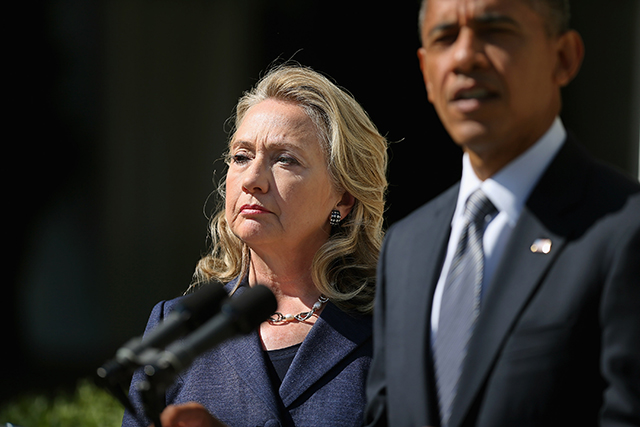The Benghazi scandal finally will get the investigative attention it should have gotten months ago. House Speaker John Boehner (R–Ohio) said today that he will appoint a House Select Committee to investigate Benghazi.
Boehner’s decision comes after more than five different House and Senate Committee investigations. Getting facts, documents, and eye witnesses out of the Obama administration has been like pulling teeth; punishing the terrorists and perpetrators of the September 11, 2012 attack has proven even more difficult.
Recent developments, however, have reenergized members of Congress. This week, a Freedom of Information Act request by the group Judicial Watch unearthed incriminating emails from Deputy National Security Adviser Ben Rhodes regarding the Obama White House’s attempt to construct a misleading narrative about the attacks.
Also this week, retired Brigadier General Robert Lovell told the House Government Oversight Committee that State Department inaction was the reason there was no attempt made to rescue the beleaguered Benghazi diplomats.
We are getting close to the smoking gun of the Benghazi affair.
The Select Committee should aim to answer four essential questions:
- What counterterrorism and early warning measures were in place to proactively address security threats? To learn how to prevent attacks against U.S. overseas facilities in the future, it is necessary to know what counterterrorism efforts, if any, were undertaken to reduce the threat of an attack in the first place. What procedures were taken to identify and disrupt terrorist operations aimed at diplomatic personnel and facilities or to provide early warning before an attack?
- What risk assessments were performed, and what risk mitigation measures were adopted, prior to the attack? Eastern Libya, in particular, has long been a haven for extremist activity. Since the fall of the Muammar Qadhafi regime, Libya’s fledgling government has been unable to stem the influence of Islamists and extremist militias. This instability on the ground, therefore, created a significant risk to U.S. personnel. It is vital to understand how the State Department evaluated risk and how it elected to mitigate that risk.
- What contingency planning was undertaken and exercised to respond to armed assaults against U.S. facilities in Benghazi? Contingency planning that is flexible and adaptable is crucial to ensuring an adequate response to potential threats. In order to fully assess the response to the Benghazi attack, it is important to assess what contingency plans were in place, how sophisticated they were, and whether they were exercised or implemented.
- How was the inter-agency response to the incident organized and managed? A complete examination of the U.S. response, therefore, should address the command, control, and coordination of efforts to organize and integrate inter-agency efforts after the threat in Benghazi became evident.
The establishment of a select committee could be a giant step toward unraveling the real story behind the Benghazi attack, which cost four brave Americans their lives, and the cover-up that has denied Americans the truth.



























